Intro
Diagnose sodium deficiency with a blood test, checking electrolyte balance, hydration levels, and detecting hyponatremia or hypernatremia, to ensure proper treatment and prevent complications.
Sodium is an essential mineral in the body, and its balance is crucial for maintaining various bodily functions. A sodium deficiency, also known as hyponatremia, can lead to severe health complications if left untreated. One of the most effective ways to diagnose sodium deficiency is through a blood test. In this article, we will delve into the world of sodium deficiency blood tests, exploring their importance, working mechanisms, and what the results mean.
Sodium plays a vital role in maintaining fluid balance, nerve function, and muscle contraction. It helps regulate the amount of water in the body and maintains proper blood pressure. A sodium deficiency can occur due to various reasons, such as excessive sweating, diarrhea, vomiting, or certain medications. If left untreated, hyponatremia can lead to seizures, coma, or even death. Therefore, it is essential to diagnose and treat sodium deficiency promptly. A blood test is a simple and effective way to determine sodium levels in the body.
The importance of sodium deficiency blood tests cannot be overstated. These tests help healthcare professionals diagnose and monitor sodium deficiency, allowing them to provide timely and effective treatment. By measuring sodium levels in the blood, doctors can determine the severity of the deficiency and develop a treatment plan accordingly. Sodium deficiency blood tests are also essential for monitoring patients with underlying medical conditions, such as heart failure, liver disease, or kidney disease, which can increase the risk of hyponatremia.
Sodium Deficiency Blood Test Procedure

A sodium deficiency blood test is a simple and painless procedure. The test involves drawing a blood sample from a vein in the arm, which is then sent to a laboratory for analysis. The blood sample is typically drawn in the morning, after an overnight fast, to ensure accurate results. The test measures the concentration of sodium in the blood, which is usually expressed in milliequivalents per liter (mEq/L). The normal sodium level in the blood is between 135 and 145 mEq/L.
Understanding Sodium Deficiency Blood Test Results
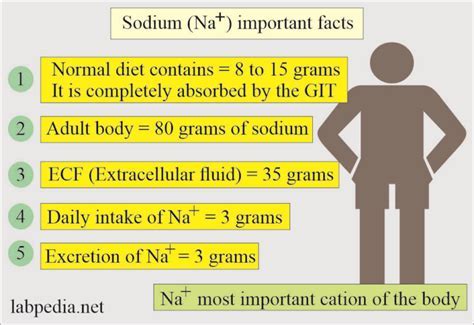
Interpreting sodium deficiency blood test results requires a thorough understanding of the normal sodium range and the underlying causes of hyponatremia. A sodium level below 135 mEq/L indicates hyponatremia, while a level above 145 mEq/L indicates hypernatremia. The severity of hyponatremia is classified into three categories: mild (130-134 mEq/L), moderate (125-129 mEq/L), and severe (less than 125 mEq/L). Healthcare professionals use these results to determine the underlying cause of hyponatremia and develop an effective treatment plan.
Causes of Sodium Deficiency
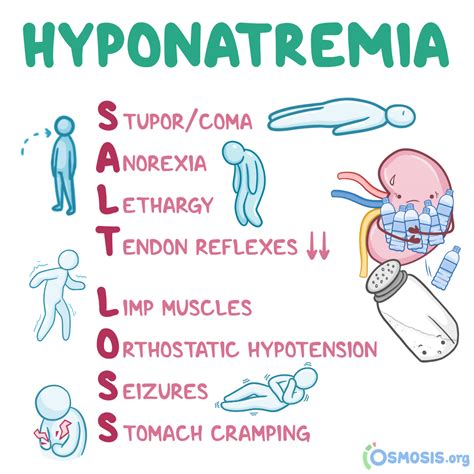
Sodium deficiency can occur due to various reasons, including:
- Excessive sweating
- Diarrhea
- Vomiting
- Certain medications, such as diuretics
- Heart failure
- Liver disease
- Kidney disease
- Syndrome of inappropriate antidiuretic hormone secretion (SIADH)
- Adrenal insufficiency
These conditions can lead to an excessive loss of sodium in the body, resulting in hyponatremia. In some cases, hyponatremia can also occur due to an increase in water intake, such as drinking excessive amounts of water during endurance sports.
Symptoms of Sodium Deficiency
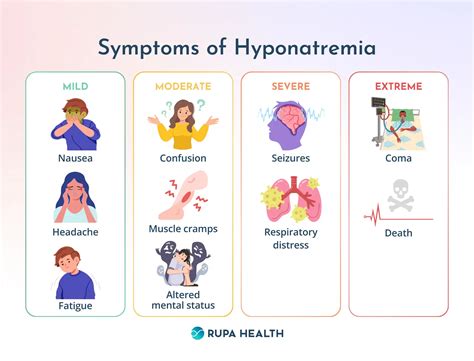
The symptoms of sodium deficiency can vary depending on the severity of hyponatremia. Mild cases may not exhibit any noticeable symptoms, while severe cases can lead to life-threatening complications. Common symptoms of sodium deficiency include:
- Headache
- Nausea and vomiting
- Fatigue
- Muscle weakness
- Seizures
- Coma
If left untreated, severe hyponatremia can lead to brain swelling, respiratory arrest, and even death.
Treatment of Sodium Deficiency
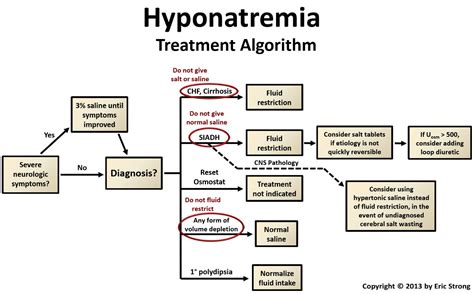
The treatment of sodium deficiency depends on the underlying cause and severity of hyponatremia. Mild cases can be treated with dietary changes, such as increasing sodium intake, while severe cases may require hospitalization and intravenous sodium replacement. In some cases, medications may be prescribed to treat underlying conditions, such as diuretics or hormone replacement therapy.
Prevention of Sodium Deficiency
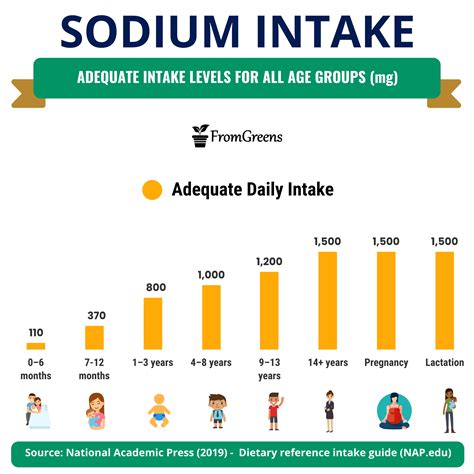
Preventing sodium deficiency is crucial to maintaining overall health. Here are some tips to prevent sodium deficiency:
- Maintain a balanced diet with adequate sodium intake
- Avoid excessive sweating, such as drinking plenty of water during endurance sports
- Manage underlying medical conditions, such as heart failure or liver disease
- Monitor sodium levels regularly, especially if taking certain medications
By following these tips, individuals can reduce their risk of developing sodium deficiency and maintain optimal sodium levels.
Importance of Regular Sodium Level Check-ups
Regular sodium level check-ups are essential for individuals with underlying medical conditions or those taking certain medications. These check-ups help healthcare professionals monitor sodium levels and adjust treatment plans accordingly. By maintaining optimal sodium levels, individuals can reduce their risk of developing complications and improve their overall health.What is the normal sodium level in the blood?
+The normal sodium level in the blood is between 135 and 145 mEq/L.
What are the symptoms of sodium deficiency?
+The symptoms of sodium deficiency can vary depending on the severity of hyponatremia, but common symptoms include headache, nausea and vomiting, fatigue, muscle weakness, seizures, and coma.
How is sodium deficiency treated?
+The treatment of sodium deficiency depends on the underlying cause and severity of hyponatremia, but may include dietary changes, intravenous sodium replacement, and medications to treat underlying conditions.
In conclusion, sodium deficiency blood tests are a crucial diagnostic tool for healthcare professionals. By understanding the importance of sodium deficiency blood tests, individuals can take proactive steps to maintain optimal sodium levels and reduce their risk of developing complications. If you have any concerns about sodium deficiency or would like to learn more about sodium deficiency blood tests, please comment below or share this article with your friends and family. Remember, maintaining optimal sodium levels is essential for overall health, and regular check-ups can help prevent complications. Take the first step towards a healthier you by prioritizing your sodium levels today!
